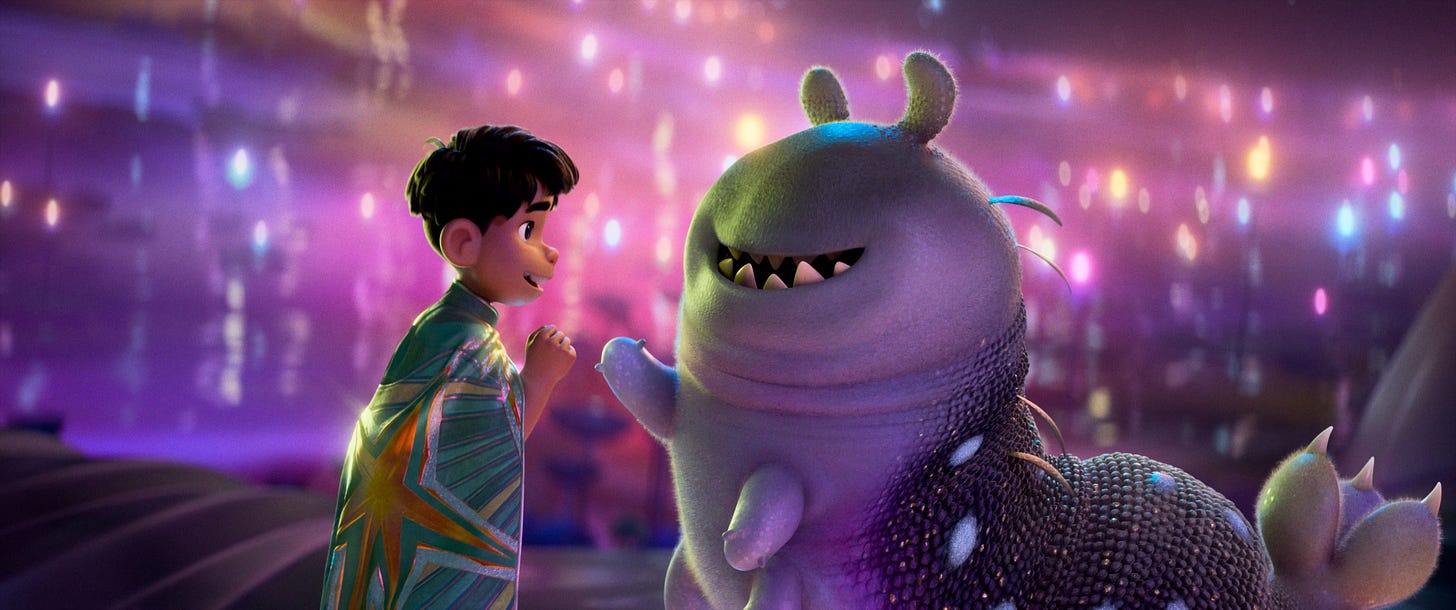Elio
Lost in space.
Early in Elio, the titular character—a preteen voiced by Yonas Kibreab—is spending his summer on the beach not frolicking or playing with other kids but scratching messages in the sand that say, “Aliens, please abduct me!” In a comic montage, Elio’s beach setup gets more and more elaborate with each day: eye-catching crystals arranged in a circle around his message to the heavens, a jerry-rigged antenna for his ham radio, new additions piling up with each attempt to make contact. Unusually for Pixar, the montage is set to a needle drop, with Elio setting up camp on the beach to the opening verse of “Once in a Lifetime” by Talking Heads. The song fits: Elio seems to be asking himself, “How did I get here?” He wants to leave Earth, to find life somewhere else out in space. More than anything, Elio wants to know that he’s not alone in the universe.
Elio is fairly straightforward as Pixar protagonists go. His two defining traits are that he’s an orphan being raised by his Tía Olga (Zoe Saldaña) and that he’s obsessed with space aliens after learning about the Voyager spacecraft’s mission to make contact with anyone else beyond Earth’s atmosphere. Olga—a major in the Air Force who spends her own days scanning the skies for space debris—has put her own dreams of becoming an astronaut on hold since becoming Elio’s guardian. She is earthbound by her responsibilities and bewildered by the child she suddenly has to raise.
As for Elio, his head’s in the sky. The film doesn’t elaborate on his character beyond the fact that he’s lonely. Nor do we get a great sense of Elio and Olga’s relationship other than their mutual lack of understanding, a strange disconnect given Elio’s interests and Olga’s career. The two have a surprising amount in common, but the movie never manages to find tension in their inability to understand each other. The plot is a sketch without depth or shading. “What if a lonely Earth child suddenly found himself surrounded by new alien friends?” is an interesting question to ask, though the movie is eager to get past the question and its answers in its rush to resolve the story with the classic Pixar formula.
Pixar’s signature creativity is at its best in its visuals, especially when Elio’s dreams come true and aliens take him away from Earth. His newfound friends are ambassadors of the Communiverse, an organization of aliens built on diplomacy and a universal translator—a little bit Star Trek, a little bit Mos Eisley cantina, with nods to beloved science fiction such as 2001: A Space Odyssey and Arrival. The visual designs for the aliens are unique and fresh; they look like undersea creatures, blobby and colorful and friendly. When confronted by hostile adversaries led by a bloodthirsty warlord, they’d rather run and hide than stand and fight.
Enter Elio, who is so eager to prove his place in his newfound community that he is willing to try negotiating with that warlord. Along the way, he makes a new friend in an alien his age named Glordon (Remy Edgerly)—a cheerful, toothy, eyeless cross between a tardigrade and a grub—who, like Elio, feels misunderstood. Childhood loneliness, it seems, can be truly universal.
There’s an ache that comes with the feeling that something else must be out there, beyond the limits of what we know and see. The film offers glimpses of this ache in repeated shots of Elio alone on the beach, most effectively in a long shot of the boy on his own at night on the edge of the waves, the moon hidden by a cloud. He feels unwanted, and he wants to escape. Whenever Elio or Olga try to talk to each other, the ache dulls, not because they’re able to understand each other but because the movie doesn’t manage to draw out their misunderstandings clearly. The conflict remains soft and formless because the script pulls its punches, repeating beats from other, better movies. Elio is beautiful, but emotionally it’s no Lilo & Stitch (2002). And although the story does belong to its titular character, its emotional arc hits hardest in Glordon’s supporting story—that of a tender heart asked to weigh the expectations of his culture against his own hopes for the future and to find himself somewhere in the balance.
In true Pixar fashion, the climax is a bit of a shock to the system. Each character gets what they need even if it isn’t precisely what they want, and each of them grows toward a conclusion that satisfies the needs of the story. If it weren’t Pixar, it would be more startling, but the studio’s storytelling has a rhythm now that is easier to predict than it was fifteen years ago. There’s a turn of acceptance near the end that feels almost unearned, though it makes sense given the arc of the story. Edgerly’s vocal performance lends his character an emotional depth that the rest of the film doesn’t quite live up to. I wish it had been a little less calculated and a little more deeply examined. But this is a movie about and for children, and children don’t need complexity for a story to work. That’s grace, isn’t it? An undeserved reconciliation. A chance to see, even if for just a moment, another person for who they truly are and to love them for it.—Sarah Welch-Larson
★★☆☆
Elio is in wide release now.



